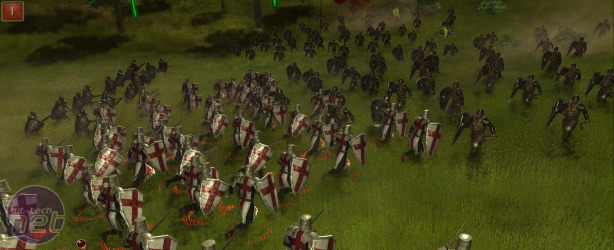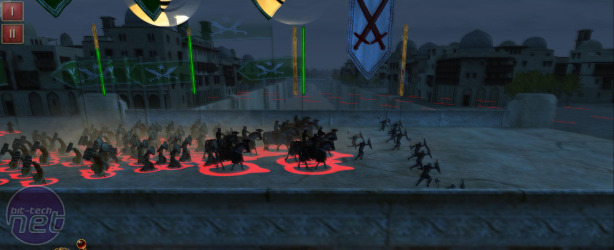
Lionheart: The Kings’ Crusade Review
Publisher: Paradox InteractivePlatform: PC exclusive
UK Price (as reviewed): £34.95 (inc VAT)
US Price (as reviewed): $39.99 (exc Tax)
Lionheart is a surprisingly decent little strategy game – and we’re saying that first because, between the medieval RTS gameplay, box art and title, you’d be forgiven for predicting it as a yet another disappointing budget title. At first glance Lionheart looks to be just another tired, predictable strategy title and, while that’s somewhat true, it isn’t the whole story.
Lionheart allows you to step into the shoes of either Richard the Lionheart on the side of the Crusaders, or Saladin, who represents the Saracens. The action is all set around the eponymous Kings’ Crusade, but while Lionheart has it’s basis in history it’s actually pretty far from a full-on simulation. One of the major features is that prominent figures from the period, such as Guy of Lusignan, can be recruited into your army as special units. That alone lets you change history, because we’re pretty sure that the real-life Guy didn’t lead a suicidal, single-handed charge against four squads of archers and infantry. If he did he was an idiot, because it didn’t end well.
Interestingly, the Crusader and Saracen campaigns don’t compete, but rather complement each other to form a longer story. Lionheart strongly advises players to tackle the Crusader arc first, not just because it’s supposedly easier and has tutorials built in, but also because it forms the first part of the tale – how the Holy Land was conquered. After that, the Saracen mission focus on the counter-attack.
If you’re expecting either campaign to involve grand strategy elements in the style of the Total War games though then you’re in for a bit of a disappointment, as Lionheart is mission-based rather than open-ended. A large map of the Holy Land is divided into 16 territories, each of which much be conquered to win the war. It’s somewhat similar to the old C&C titles, though the actual fights are fought on a much larger and more modern scale.
Planning your invasion can get a bit more complicated as you delver deeper into the game though, especially for the Crusaders. Richard the Lionheart is forced to work alongside other nations under the orders of the Papal Court, a fact which is reflected in a politics system that becomes increasingly important the further you progress. Each faction has certain priorities and demands, which often conflict, but catering to their wishes through optional objectives can net you some impressive bonuses.
The Saracens are luckily saved all of this backstabbing and politics nonsense by virtue of being a united front working against a common enemy. As a result, the Saracen campaign features a more conventional research tree that allows new technologies to be unlocked.
Lionheart is quick to claim that the Saracen campaign is more difficult to master and much more complex than the Crusader option, but in our experience this wasn’t really the case. It’s not simply that the Saracen campaign does away with the often unwieldy politicking, rather that by presenting available advantages in a tech tree makes it easier to keep track of your strengths as the Saracens. That in turn makes it easier to keep your advantages in mind, as you’re proceeding along a preset path – which is important since you can’t bring up a list of your unlocked rewards while in a fight.

MSI MPG Velox 100R Chassis Review
October 14 2021 | 15:04











Want to comment? Please log in.